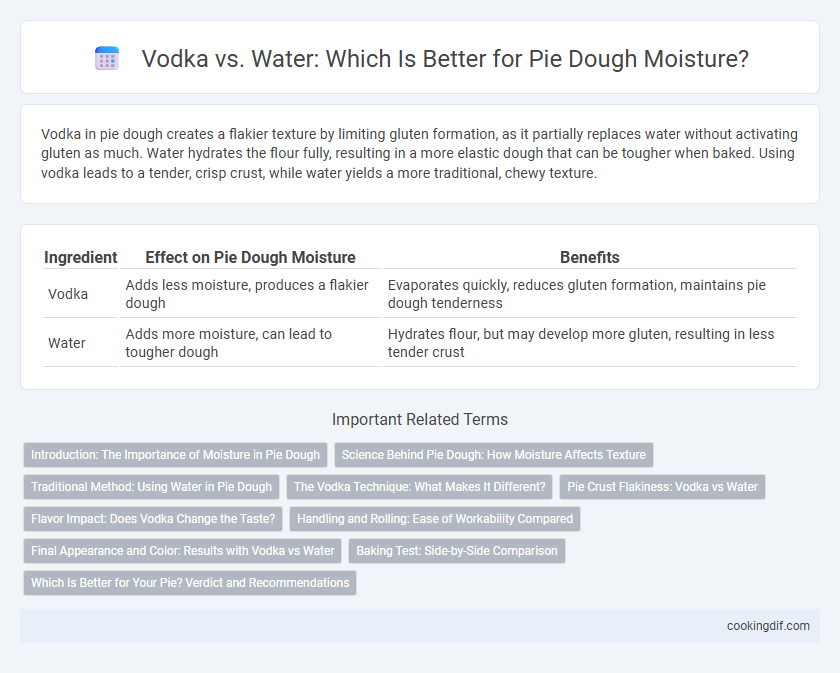Vodka in pie dough creates a flakier texture by limiting gluten formation, as it partially replaces water without activating gluten as much. Water hydrates the flour fully, resulting in a more elastic dough that can be tougher when baked. Using vodka leads to a tender, crisp crust, while water yields a more traditional, chewy texture.
Table of Comparison
| Ingredient | Effect on Pie Dough Moisture | Benefits |
|---|---|---|
| Vodka | Adds less moisture, produces a flakier dough | Evaporates quickly, reduces gluten formation, maintains pie dough tenderness |
| Water | Adds more moisture, can lead to tougher dough | Hydrates flour, but may develop more gluten, resulting in less tender crust |
Introduction: The Importance of Moisture in Pie Dough
Moisture plays a crucial role in achieving the perfect pie dough texture, balancing tenderness and flakiness. Vodka in pie dough provides moisture without activating gluten, resulting in a more tender crust compared to water, which can make dough tougher by promoting gluten development. Selecting vodka over water enhances dough elasticity and prevents overworking, yielding a superior pie base.
Science Behind Pie Dough: How Moisture Affects Texture
Vodka enhances pie dough texture by inhibiting gluten formation, resulting in a flakier crust compared to water, which promotes gluten development and toughness. The science behind this lies in vodka's alcohol content, which partially evaporates during baking, preserving moisture without activating gluten proteins. Using vodka in dough creates a tender, crisp pie crust by balancing hydration and gluten strength more effectively than water alone.
Traditional Method: Using Water in Pie Dough
Using water in traditional pie dough recipes ensures a tender, flaky crust by providing just enough moisture to bind ingredients without overpowering the dough's delicate texture. Unlike vodka, which impedes gluten development for extra flakiness, water maintains the classic elasticity and flavor profile essential to time-honored pie crusts. Incorporating cold water gradually helps achieve consistency while allowing the butter or shortening to remain solid, resulting in a perfectly layered, crispy finish.
The Vodka Technique: What Makes It Different?
The vodka technique in pie dough replaces a portion of water with vodka, leveraging its unique evaporation properties to create a flakier crust. Unlike water, vodka's alcohol content inhibits gluten formation, resulting in a tender, delicate texture without sacrificing moisture. This method enhances dough pliability and prevents overworking, making it a preferred choice for achieving perfect pie crusts.
Pie Crust Flakiness: Vodka vs Water
Using vodka instead of water in pie dough enhances crust flakiness by limiting gluten formation due to vodka's alcohol content, which partially evaporates during baking, resulting in a tender, crisp texture. Water hydrates flour fully, promoting gluten development that can lead to a tougher, less flaky crust. Vodka's lower hydration effect helps create air pockets, improving overall dough handling and yielding a lighter, flakier pie crust.
Flavor Impact: Does Vodka Change the Taste?
Vodka in pie dough enhances flakiness without imparting a strong alcoholic flavor because its neutral taste evaporates during baking, unlike water which remains flavorless but can produce a denser crust. The alcohol inhibits gluten formation more effectively, resulting in a tender, crisp texture that subtly elevates the overall flavor profile without detecting vodka's presence. Bakers often prefer vodka for pie dough moisture as it improves texture while maintaining the traditional pie taste.
Handling and Rolling: Ease of Workability Compared
Pie dough made with vodka tends to be easier to handle and roll due to vodka's ability to inhibit gluten formation, resulting in a more tender and less elastic dough. Water-based doughs often develop stronger gluten networks, which can make rolling more challenging and increase the risk of tearing. Using vodka provides a smoother texture and improved workability, allowing for thin, even rolling without excessive shrinkage during baking.
Final Appearance and Color: Results with Vodka vs Water
Using vodka instead of water in pie dough results in a noticeably flakier crust with a lighter, more delicate color due to alcohol inhibiting gluten formation and evaporating quickly during baking. Vodka-based doughs tend to brown evenly and develop a golden hue without becoming overly tough or dense, enhancing the final visual appeal. In contrast, water-based doughs often produce a denser crust with a slightly duller, less uniform color, potentially impacting the pie's overall presentation.
Baking Test: Side-by-Side Comparison
In a baking test comparing vodka and water for pie dough moisture, vodka results in a flakier, less tough crust due to its lower gluten formation. Water hydrates the flour more fully, leading to a denser, chewier texture. Incorporating 2-3 tablespoons of vodka in a standard pie dough recipe enhances tenderness without compromising structure.
Which Is Better for Your Pie? Verdict and Recommendations
Using vodka instead of water in pie dough results in a flakier, more tender crust due to vodka's ability to inhibit gluten formation while evaporating quickly during baking. Water-based dough tends to produce a firmer texture but may require more careful handling to avoid toughness. For a delicate, crisp pie crust, vodka is recommended, but water remains a suitable choice for simpler, budget-friendly pies.
Vodka vs water for pie dough moisture Infographic

 cookingdif.com
cookingdif.com